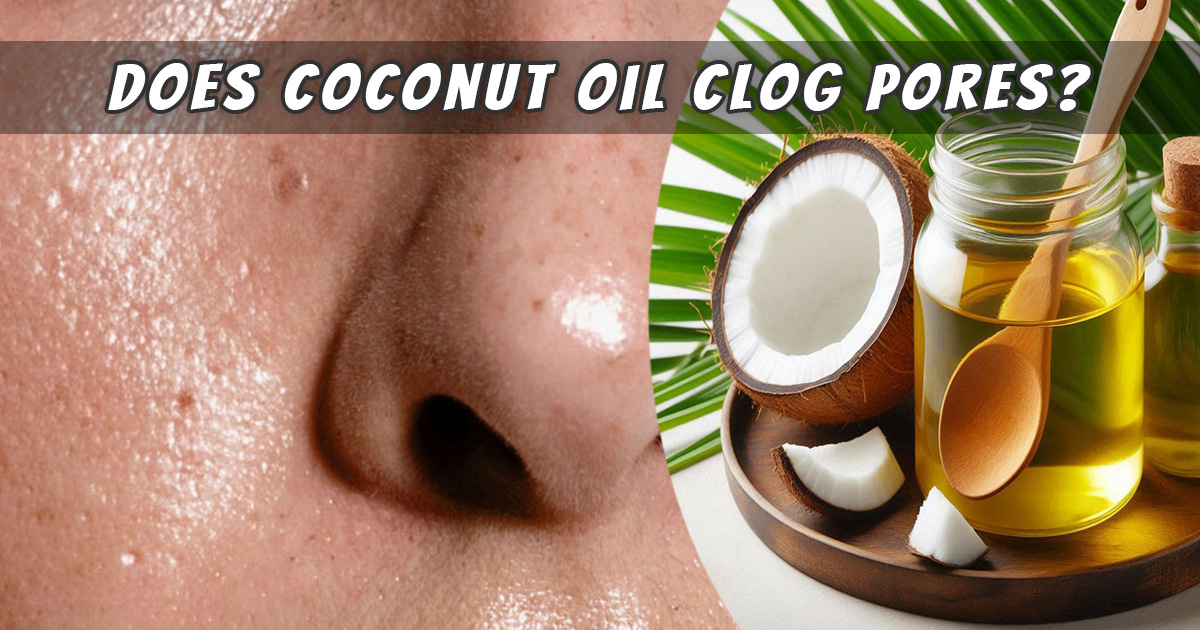Coconut oil is one of the most versatile natural products, often used for cooking, hair care, and skincare. However, a common question that arises is, “does coconut oil clog pores?” While coconut oil offers many skin benefits, it’s essential to understand whether it’s suitable for your skin type. In this article, we’ll explore the 5 powerful facts about does coconut oil clog pores?, along with practical tips for using it in your skincare routine.
1. Coconut Oil is Comedogenic
The term comedogenic refers to the likelihood of a product clogging pores, which can lead to breakouts, blackheads, and acne. Coconut oil has a relatively high comedogenic rating, typically ranked as a 4 out of 5. This means that coconut oil can clog pores, especially if you have oily or acne-prone skin. Those with sensitive skin should be cautious when applying it to their face.
2. It’s Rich in Fatty Acids
Coconut oil contains lauric acid, a type of fatty acid known for its antimicrobial and anti-inflammatory properties. While these qualities are excellent for fighting bacteria and reducing inflammation, the thick texture of coconut oil may trap dirt and debris in the pores, which can lead to congestion and breakouts. Does coconut oil clog pores for everyone? Not necessarily, but it depends heavily on your skin type.
3. Coconut Oil is a Natural Moisturizer
Coconut oil is widely praised for its ability to hydrate and moisturize the skin. Its deep-penetrating properties help lock in moisture, making it a popular choice for dry skin. However, people with combination or oily skin might experience clogged pores if they apply too much, as the oil creates a thick layer on the skin’s surface.
4. Skin Type Matters
When determining whether coconut oil clogs pores, skin type plays a crucial role. Individuals with dry or normal skin are less likely to experience clogged pores from coconut oil compared to those with oily or acne-prone skin. If you’re prone to breakouts, consider using non-comedogenic oils, which have a lower chance of clogging your pores.
5. It’s Best Used in Moderation
To prevent clogged pores, use coconut oil sparingly on your face, especially if you have acne-prone skin. A small amount can provide excellent hydration, but applying too much can trap excess oil and impurities in the skin. You can also test it on a small patch of skin before using it all over your face to see how your skin reacts.
What is Coconut Oil’s Comedogenic Rating?
When evaluating whether a skincare product will clog your pores, understanding its comedogenic rating is essential. Coconut oil has a comedogenic rating of 4, meaning it has a higher likelihood of clogging pores for people with oily or acne-prone skin. Does coconut oil clog pores for everyone? You can learn more about comedogenic ratings and their effects on the skin on Healthline.
Why is the Comedogenic Rating Important?
The comedogenic rating helps you determine whether a product is suitable for your skin type. For example, individuals with acne-prone or oily skin should avoid products with a high rating, such as coconut oil, to minimize the risk of breakouts.
Coconut Oil for Oily Skin
People with oily skin are at a higher risk of developing acne when using coconut oil because the oil can combine with natural skin oils, leading to excess sebum production. For oily skin types, it’s better to use non-comedogenic alternatives that provide moisture without clogging pores.
Is Coconut Oil Safe for Acne-Prone Skin?
The question of whether coconut oil is good for acne-prone skin has been debated for years. While coconut oil does offer antibacterial and anti-inflammatory properties, its potential to clog pores makes it unsuitable for those with acne-prone skin.
Coconut Oil Can Aggravate Acne
Due to its thick consistency, coconut oil may create a barrier on the skin, trapping bacteria, dead skin cells, and oil in the pores. This can lead to an increase in acne, whiteheads, and blackheads, particularly for individuals with acne-prone skin. In this case, it’s better to avoid using coconut oil on your face and opt for non-comedogenic oils that won’t clog your pores.
Coconut Oil for Clear Skin
If you have dry or normal skin, coconut oil can help hydrate and smooth the skin, potentially contributing to clearer, more radiant skin. However, does coconut oil clog pores for people with acne? The risk of clogged pores outweighs the benefits, so it’s essential to use it cautiously.
How to Use Coconut Oil in Your Skincare Routine (Without Clogging Pores)
Despite the potential for clogged pores, you can still use coconut oil in your skincare routine if it suits your skin type. Here’s how to use coconut oil in your skincare routine without causing pore congestion.
1. Cleanse Properly
Before applying coconut oil, ensure your skin is thoroughly cleansed. This helps remove excess dirt and oil, reducing the chance of clogged pores when you apply the oil.
2. Use as a Nighttime Moisturizer
For those with dry or normal skin, coconut oil works best when applied as a nighttime moisturizer. This allows the oil to absorb into the skin overnight without being affected by environmental factors.
3. Combine with Other Oils
If you’re worried about coconut oil clogging your pores, try mixing it with lighter, non-comedogenic oils like jojoba or rosehip oil. This reduces the density of the coconut oil and makes it less likely to clog pores.
Best Alternatives to Coconut Oil for Acne-Prone Skin
If you’re concerned about the potential for coconut oil to clog your pores, there are several non-comedogenic oils that offer similar benefits without the risk of breakouts. Here are the best alternatives to coconut oil for acne-prone skin.
1. Jojoba Oil
Jojoba oil closely mimics the skin’s natural sebum, making it an excellent option for those with oily or acne-prone skin. It’s non-comedogenic, meaning it won’t clog your pores, and it helps balance oil production.
2. Rosehip Oil
Known for its anti-aging and skin-regenerating properties, rosehip oil is a great alternative to coconut oil. It is lightweight and doesn’t clog pores, making it suitable for sensitive and acne-prone skin.
3. Grapeseed Oil
Grapeseed oil is another non-comedogenic oil that offers moisturizing benefits without clogging pores. It contains antioxidants that help fight acne-causing bacteria and is an excellent option for those with acne-prone or oily skin.
Benefits of Coconut Oil for Your Skin
While concerns about clogged pores exist, coconut oil has numerous benefits for your skin when used properly. Let’s explore the benefits of coconut oil for the skin, especially for those with dry or normal skin types.
1. Deep Hydration
Coconut oil is known for its ability to penetrate deeply into the skin, providing long-lasting hydration. This is particularly beneficial for people with dry or flaky skin.
2. Antibacterial Properties
The lauric acid found in coconut oil has antibacterial properties, which can help fight off bacteria on the skin, reducing the risk of infections.
3. Soothing Irritated Skin
If you have irritated or inflamed skin, coconut oil can offer soothing relief due to its anti-inflammatory properties. It can be applied to areas affected by eczema or dermatitis for calming effects.
Common Myths About Coconut Oil and Pore Clogging
There are many myths surrounding coconut oil and its ability to clog pores. Let’s address a few of the most common misconceptions.
Myth 1: Coconut Oil Works for All Skin Types
While coconut oil is beneficial for some, it doesn’t work for all skin types. Those with oily or acne-prone skin should avoid using coconut oil on their face, as it’s more likely to clog pores and cause breakouts.
Myth 2: Coconut Oil Always Causes Breakouts
Coconut oil doesn’t always cause breakouts, but it can if you have sensitive or acne-prone skin. For people with dry or normal skin, it can be a hydrating addition to their skincare routine without leading to clogged pores.
FAQs About Using Coconut Oil on Your Skin
Q: Can I use coconut oil on my face every day?
A: You can use coconut oil on your face if you have dry or normal skin, but those with oily or acne-prone skin should avoid daily use as it may clog pores.
Q: Is coconut oil good for acne-prone skin?
A: Coconut oil is generally not recommended for acne-prone skin due to its high comedogenic rating, which can lead to clogged pores and breakouts.
Q: Can I use coconut oil if I have combination skin?
A: Yes, but with caution. If you have combination skin, it’s best to apply coconut oil only to the dry areas of your face. Be sure to avoid the oily parts to prevent clogged pores and breakouts. Consider using non-comedogenic oils like jojoba oil for a lighter alternative.
Conclusion
So, does coconut oil clog pores? The answer depends largely on your skin type. While coconut oil offers numerous benefits for hydrating and soothing the skin, it has a high comedogenic rating, meaning it may clog pores for individuals with oily or acne-prone skin. If you have dry or normal skin, coconut oil can be a valuable part of your skincare routine. However, those with acne-prone skin should consider using non-comedogenic alternatives like jojoba or rosehip oil to avoid breakouts.
For more skincare tips and recommendations, visit MyReadMagazine.com to explore a range of natural skincare solutions.




